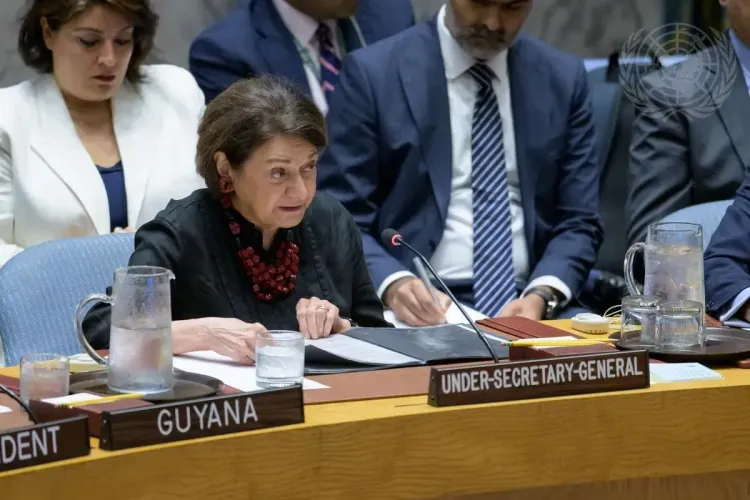Is Urgent Diplomacy the Key to Resolving the Israeli-Iranian Crisis?

Synopsis
Key Takeaways
- Urgent diplomacy is needed to de-escalate tensions between Israel and Iran.
- The conflict has resulted in significant civilian casualties in both nations.
- Recent diplomatic meetings show that opportunities for peace still exist.
- The regional implications of this conflict are far-reaching and dangerous.
- Preventing a humanitarian crisis is a priority for the international community.
United Nations, June 21 (NationPress) UN Undersecretary-General for Political Affairs Rosemary DiCarlo emphasized the critical need for diplomacy to alleviate the rising tensions between Israel and Iran.
The opportunity to avert a disastrous escalation and foster a peaceful resolution remains open, highlighted by the recent meeting in Geneva attended by the Iranian foreign minister and his counterparts from Britain, France, and Germany, according to DiCarlo.
"We ardently support such initiatives. Every possible avenue for de-escalation must be pursued, and hostilities must cease, allowing for disputes to be resolved through peaceful means," she stated during an emergency session of the Security Council. "The necessity for diplomacy has rarely been more pressing."
DiCarlo noted that the extent and intensity of assaults in Iran and Israel are escalating, leading to dire consequences for civilians in both nations, as reported by Xinhua.
In Iran, Israel claims to have targeted over 100 military installations and nuclear sites. Concurrently, government buildings, residential areas, factories, hospitals, airports, and refineries have been struck. The bombing of Iran's state-run television channel during a live broadcast this past Tuesday was particularly alarming, she remarked.
In Israel, residential neighborhoods and critical infrastructure have suffered damage across the country. Numerous civilian sites have been directly affected, with a national emergency still declared, imposing stringent restrictions on air travel.
The airspace in the Middle Eastern region remains heavily restricted due to ongoing airstrikes, not only between Iran and Israel but also extending to Syria, Jordan, Lebanon, Iraq, and beyond, DiCarlo stated.
The escalating cycle of attacks has led to hundreds of civilian casualties in both nations. As of Thursday, reports indicated that 224 individuals had died and over 2,500 were injured in Israeli strikes across Iran. In Israel, strikes from Iran resulted in 24 fatalities and 915 injuries, according to official statistics from both nations.
"We are on the brink of a full-scale conflict and humanitarian disaster," DiCarlo warned. "The regional implications of this conflict are unfolding before us, illustrated by missile launches from the Houthis in Yemen targeting Israel, and increased tensions with armed factions in Iraq. Any further escalation could have substantial ramifications for the region and international peace and security as a whole."









